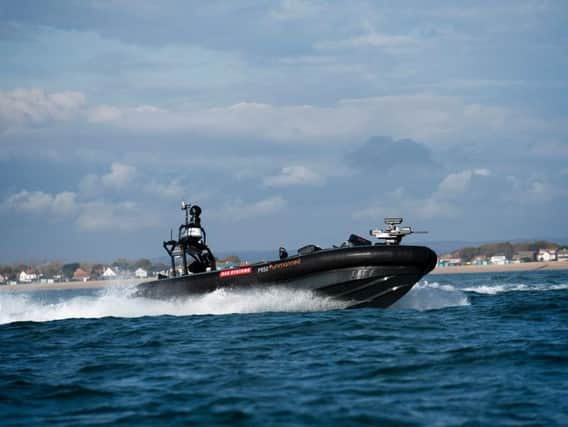Unmanned boats a step closer after BAE Systems trials


It will allow navies to go beyond the limits of human endurance with unmanned vessels that can travel further, for longer and to more inhospitable environments.
The autonomous Pacific 950 Rigid Inflatable Boat demonstrator has been used to develop and prove innovative technologies which have the potential to make naval missions faster, easier and safer, taking the relationship between human and machine to new territories.
Advertisement
Hide AdAdvertisement
Hide AdDeveloped alongside industry experts from L3Harris and MSI Defence Systems, the P950 is equipped with automated navigational decision-making technologies, freeing up operators to focus on mission critical information from afar.
To enhance the capability of existing warships, the technology has been designed to be retrofitted to existing RIBs, such as BAE Systems’ Pacific 24, which is currently in service with the Royal Navy across its surface fleet.
The vessel can operate for up to 10 days at ‘patrol speed’ or 300 nautical miles in pursuit mode, reaching speeds of up to 45 knots, whilst either being remote controlled or on a semi-autonomous mission. Trials conducted by BAE Systems have shown how the technology provides a unique ability to undertake complex, multi-phase missions and support advanced dynamic tasking, whilst providing enhanced situational awareness to support faster and more effective decision-making by naval operators.
It has potential applications across a range of missions, including anti-piracy operations, border control, persistent intelligence gathering, maritime security and force protection. The use of autonomous vessels in high-risk areas would allow operations to be conducted without endangering sailors.
Advertisement
Hide AdAdvertisement
Hide AdMike Woods, Chief Technologist for BAE Systems’ Maritime Services business, said: “This technology represents a huge step forward in the interaction between human and machine, combining sophisticated autonomous technology with human capabilities to overcome many of the challenges faced in difficult conditions at sea.
"The boat keeps sailors out of harm’s way whilst allowing them to respond to the increasingly varied, often unpredictable scenarios they face every day, and aids faster decision making in complex and ambiguous situations.”
First introduced on an experimental basis in 2015 and trialled as part of the Royal Navy’s Unmanned Warrior exercise in 2016, the work now completed, in collaboration with the UK Ministry of Defence, has evolved the technology on the P950 demonstrator to an advanced state of readiness.
Further work will be conducted by BAE Systems in coming months to prove the technology can be integrated with existing naval ship combat management systems. The RIB will also undertake further trials, including participation in NATO Exercise REPMUS, to be held in Portugal later this year